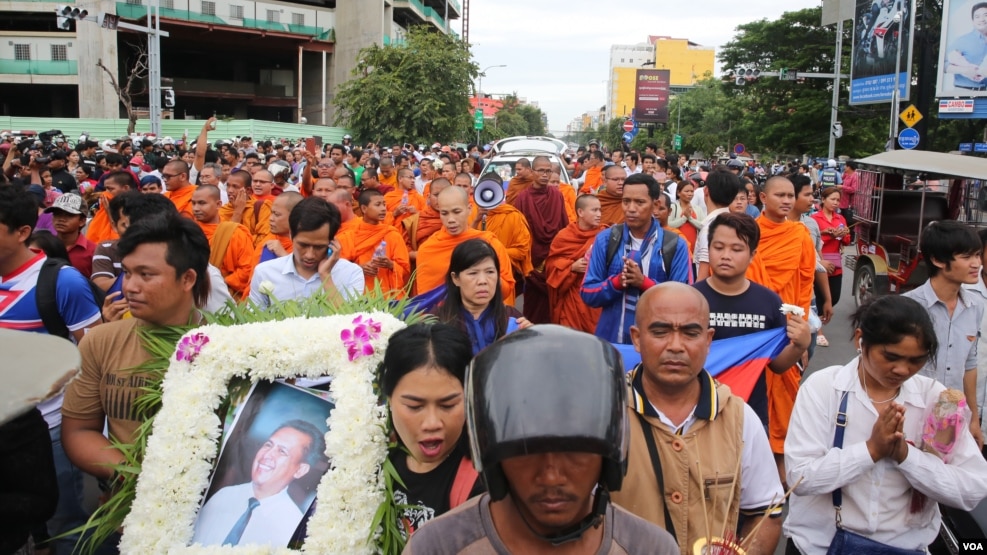24 July 2016 voa
Hoeun Sopheak

A procession of Kem Lei’s body on Preah Monivong Blvd in Phnom Penh in July 10th, 2016
It is potentially dangerous to be too well educated in Cambodia.
WASHINGTON —
The killing of Dr. Kem Ley sent shock waves through Cambodia.
Thousands took to social media to express their grievances, and thousands more paid their respects during his funeral ceremony.
Kem Ley’s death has brought the value of education and the country’s intellectuals to the forefront, and two opposing sentiments have emerged:
Those who fear, become more fearful.
Those who dare, become more daring.
Killing a well-known intellectual was like sending a message to the public that too much education is not a good thing in Cambodia, said Hang Vuthika, a Master’s student in Public Policy at the University of Nottingham in England.
“It seems like education—as it gets higher—becomes less valuable,” Vuthika said of Kem Ley’s killing.
“This affects the feelings of other intellectuals,” he said.
“Some said that they don’t even dare to get a PhD. It seems like the term PhD has become pejorative.”
According to Hang Vuthika, Cambodian students may prefer to hide their abilities, as being too smart in the current political environment might “bother” some, and that “welcomes troubles” in contemporary Cambodia.
Catherine Harry, a 21-year-old undergraduate student at Pannasastra University of Cambodia in Phnom Penh, expressed a similar sentiment: It is potentially dangerous to be too well educated in Cambodia.
“When I heard about it, I was surprised, and I just couldn’t believe it because in Cambodia, in 2016, yet there still is this kind of issue. An educated person got killed because he dared to speak his mind,” she said.
“It makes us feel pressured that no matter how much we try to get educated, we still have pressure to be not so smart,” she said.
That pressure may be a factor that encourages some Cambodian students studying abroad to not return home, as they may fear putting their knowledge into practice may cause them problems in the future. Which means Cambodia loses much-needed human capital.
Optimism still exists, however.
“When I saw people taking part in [Kem Ley’s] funeral procession, showing their grievances, I thought people do not fear the threats anymore,” said Prum Seila, a Master’s graduate in Development Communication from the University of the Philippines.
Prum Seila said that Kem Ley’s analysis represented the perspective of millions of Cambodians who could not speak up for themselves.
“He was an intellectual who did so much for the country, and what he got in return was to get killed viciously in the middle of the capital, Phnom Penh,” said Noan Sereiboth, a Royal University of Phnom Penh alumnus in Sociology.
“The killing of Dr Kem Ley is a great loss.”
The murder of a high-profile intellectual such as Kem Ley may cause concern for students in Cambodia, said Sorn Ramana, who is undertaking a Master’s degree in Human Rights at Kingston University in England.
However, the killing may also rally others to Kem Ley’s cause, Sorn Ramana said.
His death “may also be a push factor for those who share Dr. Kem Ley’s fight for freedom of expression to speak up, to express themselves,” she said.
Kem Ley’s “patriotism” may inspire others “to carry on the fight for Cambodia to be a country that respects the freedom of speech.”
There are signs that may be happening.
On July 15, just days after the killing, around 100 Cambodian intellectuals and researchers issued a joint statement condemning Kem Ley’s assassination and demanding justice and prosecutions.
“We call on the authorities and relevant bodies to investigate this case thoroughly, quickly, without any discrimination, and to honestly expose those who ordered the killing and their accessories—whether they are Cambodian or foreign—and to bring them to justice,” the statement read.
The statement stressed the need to “find the real motive behind this ruthless assassination.”

1 comment:
“It is potentially dangerous to be too well educated in Cambodia.”
Yes, because it is ‘almost’ impossible for a very well educated person to be an ass-kisser, in the other words if a person wants to be an ass-kisser why does he/she need a higher education for?
Post a Comment